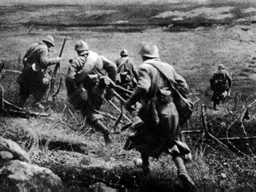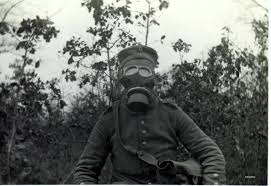British and French Get Ample Warning; Make No Preparations
Special to The Great War Project
(14-16 April) In these days a century ago, a German prisoner of war tells his British captors that the German army is stockpiling thousands of canisters of chlorine gas at the Belgian town of Ypres.
Both sides are keenly aware that the Western Front is locked in frustrating stalemate. For months there is little movement on the devastated battlefield, a maze of trenches and barbed wire.
But that does not prevent each side from the occasional effort to break out of the deadlock.
In the month of April a century ago, the Germans try another final assault at Ypres, the scene of devastating clashes in 1914. “It was,” writes historian Norman Stone, “another exercise in Prussian crassness.”
But, reports Stone, “a new weapon had come to hand. Poison gas.”
Small-scale gas attacks were already attempted initially on the Russian front in January, “when gas-filled shells had been fired on the Russian positions west of Warsaw,” writes war historian John Keegan. Those shells are not deadly though; they produce tears but do not kill.
According to Keegan, “it appears to have troubled the Russians not at all.” In addition writes Stone, “the extreme cold reduced its effectiveness.”
In using any kind of gas weapons, the Germans defy their obligations under the Hague Conventions to refrain from using gas weapons. These conventions, negotiated in 1899 and 1907, are among the earliest attempts to establish laws of warfare.
Germany is a signatory of the Conventions, but it justifies its use of this kind of weapon because some French rifle bullets release gas upon impact.
By April though, “the Germans had a killing agent available in quantity in the form of chlorine,”
…reports Keegan. Chlorine brings about death by flooding the lungs with liquid, in effect causing death by drowning.
The Germans hope that poisonous chlorine gas will be devastating to the British and French side. The plan is for the use of gas to disguise German intentions as they move troops away from the deadlocked Western Front to the east, in preparation for a joint German-Austrian offensive against the Russian army. Austria is badly in need of German support.
Without it, the Austro-Hungarian Empire is facing collapse.
The Germans are also eager to experiment with poison gas on the battlefield to determine just how effective gas shells will be.
“Allied commanders around Ypres had ample warning that a gas attack was coming,” writes historian Adam Hochschild. “From an intercepted German message requisitioning 20,000 gas masks, from a deserter who, more than a week before the assault, brought one of the masks with him, and from captured German soldiers who told of masses of gas canisters lined up near their trenches.”
In mid-April one hundred years ago…
…it all adds up to a German plan to launch large-scale poison gas attacks against the British and French near Ypres.
But reports Hochschild, British generals “made not the slightest preparations, reluctant yet again to acknowledge that warfare could take a radically new direction.”
“Not only had British and French generals been unprepared for gas, they had refused to even imagine it.”


